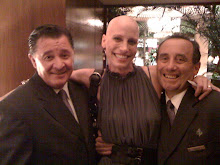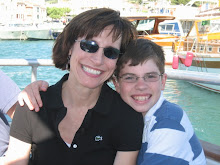Yesterday, we had our first meeting with Karen's medical oncologist, Dr. Kaplan-Tweed (the latest member of Karen's medical team). She's a terrific doctor. The kind who studies your case and history before she walks into the room, listens (imagine that?), and is willing to spend whatever time it takes to answer questions and make you comfortable (as comfortable as one gets with the topic of chemotherapy). And it doesn't hurt that she has a Facebook page with 79 friends. But trust me, I'm not planning on befriending her.
She had a sidekick named Jim -- another great doctor who is doing his fellowship at Penn. Turns out that young Jim remembered being honored by Governor Casey at the State Capitol for winning the Geography Bee. That was 1988. Jim was in 8th grade. Funny thing is that I was working for Governor Casey back then at the young age of 25. In fact, I probably wrote the proclamation honoring young Jim. And now here he is treating Karen.
So back to the chemotherapy. There's a lot to this (actually, about 4 pages of notes) that I won't get into here. It's overwhelming. This "journey" just took a brief ride through the "House of Horrors." In short, Dr. Kaplan-Tweed (and Jim) started by outlining a combination of two chemo drugs, Taxotere and Cytoxan (aka TC) that come with most of the expected (and some unexpected) side effects: hair loss, low white blood count which increased risk of infection, fatigue, mouth sores, neuropathy and, of course, the dreaded GI and nausea side effects. But keep in mind, Dr. Tweed assures us, "chemotherapy isn't what it used to be" (I can only imagine what it used to be like). What she means is that the side effects can be managed more effectively (not the hair loss, of course). There are other possible -- though more rare, side effects -- including your nails can turn black (or even your tongue....YUCK!) and some patients get leukemia (again, rare). They lay it all out for you...the good, the bad and the ugly.
But it gets better (well, not actually better, worse). Since Karen has triple negative cancer and she has a family history that includes breast, uterine and ovarian cancer and her tumor size is greater than 1 cm (I thought that was small), she's apparently a very good candidate for a clinical trial currently underway. Because triple negative cancer tends to be more aggressive and has a higher rate of recurrence, doctors are interested in finding new ways to treat this type of cancer. The clinical trial actually uses drugs that are already FDA approved. They're not new. In fact, the drug combination (Adriamycin, Cytoxan and Taxol) is currently being used to treat breast cancer. Researchers think that using these chemo drugs in combination with another drug called Avastin (which is currently used to treat colon cancer and metastatic breast cancer) may reduce the risk of recurrence for people with Karen's type of breast cancer and history. So, what's the downside? A longer, more intensive and toxic chemo regimen. Similar side effects, but perhaps more intense. The upside: possibly getting rid of her cancer once and for all . We'll have some time to consider this option over the next couple weeks.
This all probably sounds worse than it is (right?). Right. But, it's not unusual to hear and read all of this and be filled with stark fear of these toxins that race through your veins and make you so sick you wonder what's worse, the cancer or the chemo -- and I'm not even the patient.
Karen wants to crush -- no annihilate -- this cancer with whatever it takes. As a political consultant, Karen was known to go for an opponent's jugular. She knows how to fight. Cancer, look out!






No comments:
Post a Comment